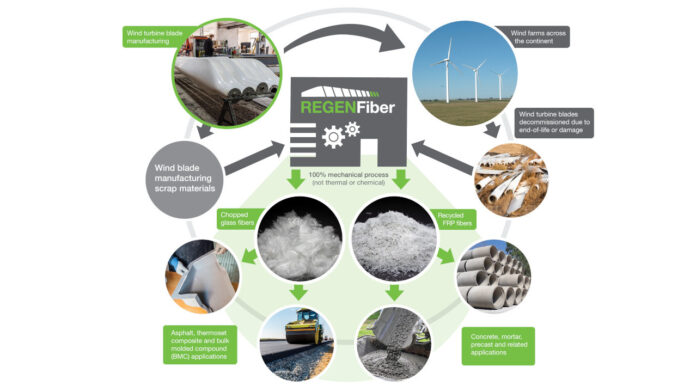
A new Iowa business is launching an innovative way to recycle wind turbine blades that are no longer in use, so they don’t end up in landfills.
REGEN Fiber, owned by Travero, has created a patent-pending and eco-friendly process to convert decommissioned wind turbine blades, primarily made from fiberglass and plastics, into reusable materials for manufacturers in the concrete, mortar and other industries.
The end product of the recycling process is a reinforcement fiber that increases the strength and durability of concrete and mortar applications such as pavement, slabs-on-grade and precast products.
REGEN Fiber also produces microfibers and additives from components of the wind blade for use in a range of composite, concrete and soil stabilization applications.
By preventing decommissioned wind turbine blades from ending up in landfills or releasing combustion byproducts, such as carbon, into the atmosphere if burned, REGEN Fiber’s new, sustainable recycling solution is helping to solve the wind industry’s growing challenge of finding environmentally friendly ways to dispose of wind turbine components, according to a Travero news release.
According to the American Clean Power Association, wind energy is the largest renewable energy source in the United States and “nearly 70,000 wind turbines across the country are generating clean, reliable power.”
“With tremendous growth projected in the wind industry and an increasing number of turbines already reaching the end of their approximately 20-year lifespan, REGEN Fiber is entering the market at the perfect time,” said Jeff Woods, director of business development at Travero. “Recycling blades without using heat or chemicals while simultaneously keeping them out of landfills or being burned supports the sustainability goals of both the wind industry and customers receiving the recycled products.”
REGEN Fiber began piloting the recycling process at a facility in Des Moines in 2021. Working with customers in the concrete industry, REGEN Fiber has been able to validate products’ performance and ensure the products meet customer requirements.
Large, commercial-scale operations for the recycling of decommissioned blades are expected to begin in the second half of 2023. A new manufacturing facility for REGEN Fiber to recycle decommissioned blades is now under construction in a section of Alliant Energy’s Big Cedar Industrial Center in Fairfax, next to Travero’s Logistics Park Cedar Rapids.
Once commercial-scale operations in Fairfax reach full production levels, REGEN Fiber anticipates recycling over 30,000 tons of shredded blade materials per year.
In addition to recycling decommissioned blades, REGEN Fiber is already recycling new wind turbine blade manufacturing scrap materials at commercial scale at the Des Moines facility. These scrap materials are processed into fibers that can be used for asphalt and composite products, helping to solve another waste management issue that exists at the start of the wind turbine blade lifecycle.
Travero, along with its subsidiary Travero Logistics, supports REGEN Fiber and its customers with all aspects related to the transportation of turbine blades and finished products across North America.
“Travero’s extensive experience and expertise in supply chain and logistics, production operations and material handling are bringing REGEN Fiber’s new recycling process to life,” Mr. Woods said. “We are proud to supply manufacturers with high-quality products that are made in the United States while helping to protect the environment for future generations.”




